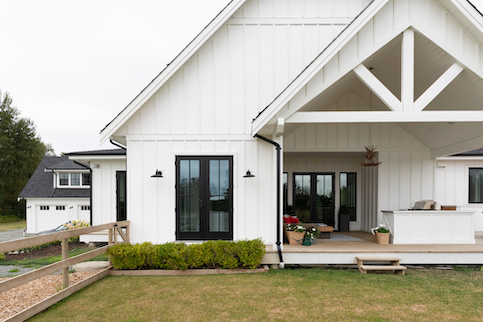Looking to buy a single-family home or apartment building but not happy with any of the properties available in your local neighborhoods? Maybe it’s time to look online for a virtual mansion, penthouse, department store or amusement park.
That might sound ridiculous at first, but digital or virtual real estate has become a real investment opportunity. You can also invest your dollars in domain names, buy existing websites or purchase a mobile app.
Some digital properties simply hold value, while others hold value and generate income in the process. You might be able to sell the digital real estate you buy today for a profit in the future.
How does all of this work? Here’s a primer on the ever-evolving world of digital real estate.
What Is Digital Real Estate?
You might think of virtual condo buildings, ranch homes and urban apartments when you think of digital real estate. But the truth is, digital real estate doesn’t just refer to virtual properties. It can also mean websites, non-fungible tokens (NFTs), digital billboards and any other online asset that has the potential to hold value or generate income.
Digital Real Estate Investing Example
Suppose you build an entertainment or celebrity gossip blog where over a number of years you publish new content, add videos and hire staffers to write additional stories and interviews. Now suppose that 5 years after starting your blog, you sell it to an investor for a hefty profit. That’s an example of digital real estate that has grown in value over time.
You might also buy a domain name and then sell it for profit to an entrepreneur. For instance, you might buy the domain name clevelandbulbs.com and sell it to a Cleveland-based entrepreneur who wants to open a lightbulb or tulip store.
How about one of the more unusual ways to make money with digital real estate? Let’s say, hypothetically, that you bought a piece of virtual land in the Metaverse – an immersive online world in which people gather to socialize, play and learn. You could hold onto this land and sell it to a Metaverse visitor who wants to build a Victorian home, carnival or museum on the site. This transaction might be done with cryptocurrency.
Or maybe you open your own virtual amusement park in the Metaverse and charge online visitors admission – again in the form of cryptocurrency such as Bitcoin.
The key is that digital real estate must have the potential to generate value or income. Buying a well-known website fronted by a brand-name retailer or organization could generate value. Buying an unknown individual’s rarely updated blog probably won’t. Consequently, that mostly ignored blog isn’t considered a true digital real estate opportunity.
What’s Your Goal?
Buy A Home
Discover mortgage options that fit your unique financial needs.

Refinance
Refinance your mortgage to have more money for what matters.
Tap Into Equity
Use your home’s equity and unlock cash to achieve your goals.
How Does Digital Real Estate Investing Work?
Digital real estate might not sound legitimate. After all, why would people pay for a slice of land that doesn’t exist in the physical world? But digital real estate does offer opportunities – which we’ll discuss next – to generate income.
Domain Flipping
You can buy a domain name, hold onto it and cross your fingers that someone wants it badly enough to pay more for that name. For instance, you might buy a domain name such as chicagorestaurantcritic.com in the hopes that someone starting his or her own restaurant blog will be willing to pay big bucks for the domain name.
Buying Websites
Maybe you find a website covering real estate investing. Perhaps the site isn’t attracting many visitors and its content hasn’t been updated recently, but you see potential. You might be able to buy it cheaply, boost its content – by adding new stories, hiring freelance writers to generate content or adding short videos – and then sell it for more than what you spent on it.
Mobile Apps
Maybe you can create a new mobile game, budgeting tool or dieting app. If you nab a big enough user base, you might then be able to sell this app for big money. You can also make money by charging people to use your app or charging them for in-app purchases, such as enhanced armor in mobile games or extra recipes in a cooking app.
Virtual Land Or Property
You can invest in digital land in the Metaverse, the virtual world that Facebook is focusing so much of its efforts on. You might then be able to sell that land to someone who wants to build a virtual mansion, amusement park or retail center on it. You may even purchase a virtual apartment building in the Metaverse and charge rent to virtual tenants.
E-Commerce Stores
You can create an e-commerce store, a website in which you sell a product you create. Products can vary. Maybe you write self-help e-books. You can sell them in your e-commerce store. Maybe you sell handcrafted chew toys for dogs. You can sell these from your e-commerce store too.
Cryptocurrency
You can invest in cryptocurrency, which is virtual money. The hope is that your virtual currency will rise in value. Be aware, though, that cryptocurrency is highly volatile. Its value can rise or drop sharply.
Ready To Become A Homeowner?
Get matched with a lender that can help you find the right mortgage.
The Pros And Cons Of Digital Real Estate Investing
Is investing in digital real estate a smart move? That depends. As with all investments, digital real estate carries risks and the potential for rewards.
Digital Real Estate Pros
A few advantages of investing in digital real estate include:
- Lower capital requirements: Buying physical real estate is expensive and often requires a mortgage loan. Buying digital real estate usually requires a far smaller upfront investment.
- Global reach: When you buy a website, open an e-commerce store, purchase a domain name or buy a piece of virtual land, you can market this digital real estate to internet users around the globe. It’s a great way to increase the potential market for your real estate.
- Investment diversification: It’s always wise to sink your dollars into multiple investment vehicles. You could try to invest your money in a variety of investment vehicles, including digital real estate. This will protect you if one type of investment – let’s say the stock market – suffers a drop.
- Scalability: You’ll have more flexibility with digital real estate. You’ll be able to quickly modify your investment, perhaps tweaking a website you purchased so that it covers a new topic. Or maybe you’ll add more acres to that plot of virtual land you purchased.
Digital Real Estate Cons
Some disadvantages that come with digital real estate investing are:
- Cybersecurity risks: As with anything pertaining to the Web, you’ll have to be on the lookout for hackers and other cybercriminals. Hackers, for instance, could hijack a website you own or disable your e-commerce store.
- Technological changes: Technology advances quickly in the online world. You might find that an e-commerce store you own, blog you publish or domain names you purchase are quickly outdated.
- Market volatility: Volatility is another common trait of the virtual world. The value of cryptocurrency, for example, can rise sharply one day and drop by just as much the next. You’ll need a high tolerance for volatility if you invest in digital real estate.
- Asset maintenance: As with physical real estate, you’ll need to spend time and money maintaining your digital real estate. If you own an online store, you’ll want to supply it with new content and products for people to buy. If you own a website, you’ll need to continually update it to keep visitors coming.
Take The First Step To Buying A Home
Find a lender that will work with your unique financial situation.
How To Invest In Digital Real Estate
Purchasing digital real estate requires some of the same steps you’d take to buy physical property. Here’s a brief overview of the steps you’ll need to take in order to start investing in digital real estate.
1. Research
Researching potential acquisitions is a key part of any investment strategy. That applies to the world of digital real estate, too. First identify the types of digital real estate that might interest you. Purchasing domain names and then selling them might be your best investment strategy if you’re not looking to put in much effort.
If you’re willing to spend more time maintaining and building your digital real estate, you might consider purchasing a website you can boost with new content or videos or opening an e-commerce store in which you’ll sell e-books or online courses.
You’ll need to set a budget too. As when investing in physical real estate, you don’t want to spend more than you can afford when purchasing digital real estate. Some types of digital real estate – including cryptocurrency, virtual land and NFTs – can sell for high prices.
Before making the acquisition, make sure that whatever piece of virtual real estate you buy fits within a budget that you set.
2. Acquisition
The acquisition phase is a key step. It’s when you close the purchase of a digital asset, whether that be a domain name, website or virtual apartment building. The good news here is that purchasing digital real estate is a much simpler process than buying a single-family home or multifamily building.
When you buy physical real estate, you’ll often need to apply for a loan – a process that could take a month or longer. When buying a domain name, though, you’ll simply do a search on a site such as GoDaddy.com or Squarespace to see if the domain name is available. If so, you can also purchase it through that site.
If you want to buy a website, you can usually contact the site’s owner and make an offer. Buying virtual land in the Metaverse is a bit more complicated. Usually, though, you’ll do this through the online world’s real estate marketplaces, websites such as Decentraland, Treeverse and The Sandbox.
3. Maintenance And Growth
In all likelihood, you’ll have to work to maintain and grow the digital real estate that you purchase. If you buy a blog, you’ll need to add content to it on a regular basis, or you won’t attract readers. If you’re running an e-commerce store, you’ll have to continually add new products to keep your sales strong.
Just as with physical real estate, any digital real estate you buy needs to be maintained.
Alternatives To Digital Real Estate Investing
Not quite ready to jump into the digital world? You can invest in plenty of real-world assets.
For example:
- Real-world real estate: Buying real estate can be expensive, but if you purchase the right property, you can earn rental income and sell it later for a profit. If you can’t afford to buy on your own, you can work with other investors in real estate investment trusts (REITs) so you can invest in real estate without purchasing a property on your own.
- Commodities: You might consider investing in commodities such as precious metals, including silver and gold. The hope is that these commodities will increase in value after you buy them.
- Retirement accounts: An easy way to invest is to deposit dollars regularly in a retirement account, such as a private IRA or employer-sponsored 401(k) plans. Regular deposits in these investments can potentially pay off big once you hit retirement age.
- Stocks: If you can handle the risk, you might invest in the stock market. Just be patient, because the value of stocks can rise or fall quickly. By selling a stock at the wrong time, you could lose thousands of dollars.
Digital Real Estate FAQs
Investing in digital real estate can be confusing. Here are answers to some questions you might have about the process.
The Bottom Line: The Rewards Of Digital Real Estate Investing Are Tangible
Interested in buying digital real estate? The potential is there for big profits – or losses. Make sure to research any investment before committing to a digital acquisition. Also, it’s important not to forget the gains you might earn by buying real-world real estate such as a single-family home that might increase in value while you own it

Dan Rafter
Dan Rafter has been writing about personal finance for more than 15 years. He's written for publications such as The Washington Post, Chicago Tribune and Wise Bread.












